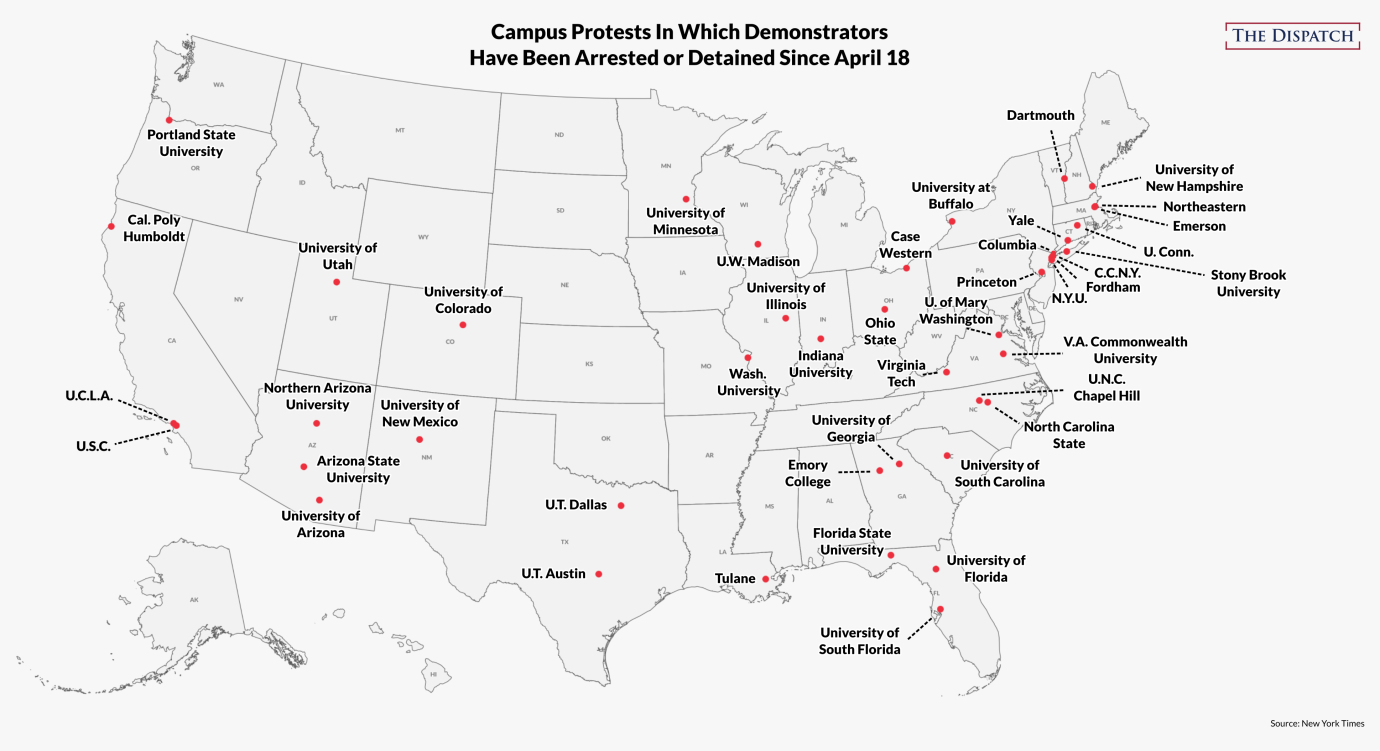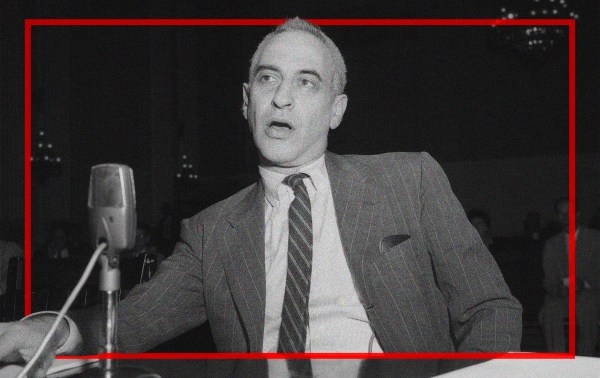Happy Friday! It took just two days for Catholic Answers to “defrock” its new artificial intelligence priest, Father Justin, after the AI apparently claimed it had been ordained by a real-life bishop, offered a user the sacrament of reconciliation, and even claimed it was A-okay to baptize a baby with Gatorade in an emergency.
Quick Hits: Today’s Top Stories
- The U.S. State Department on Wednesday formally accused Russia of using chemical weapons in its war against Ukraine. American officials said that Russia has repeatedly deployed chloropicrin, a choking agent used extensively in World War I, to “dislodge” Ukrainian positions, leading the U.S. to impose sanctions on companies with ties to Russia’s chemical weapons program. Anatoly Antonov, Russia’s ambassador to the United States, called the accusations “odious and unsubstantiated.”
- Turkey stopped all trade with Israel on Thursday over the “worsening humanitarian tragedy in Palestine,” the Turkish Trade Ministry said in a statement. The move follows restrictions Turkey imposed in April on the export of products like cement and jet fuel to Israel. “Turkey will firmly and decisively implement these new measures until the government of Israel allows an uninterrupted and sufficient flow of humanitarian aid to Gaza,” the ministry said.
- At least 29 people have died and 60 are missing after heavy rains and mudslides in Rio Grande do Sul, the southernmost state in Brazil, authorities said on Thursday. The flooding has displaced more than 10,000 people in what the state’s governor, Eduardo Leite, described as “the worst climate disaster that our state ever faced.”
- President Joe Biden on Thursday criticized anti-Israel protesters on college campuses while affirming the right to peaceful protest in his first prepared remarks on the subject since the wave of encampments began two weeks ago. “Dissent is essential for democracy,” Biden said. “But dissent must never lead to disorder.” When asked if the protests had any influence on his Middle East policy, Biden answered, “No.” Meanwhile, the Los Angeles Police Department cleared the University of California, Los Angeles encampment on Thursday morning, making 209 arrests.
- Arizona Democratic Gov. Katie Hobbs on Thursday signed into law a repeal of the state’s 1864 abortion law, which banned abortions from the moment of conception with exceptions only to save the life of the mother. The repeal passed Arizona’s Republican-controlled Senate in a 16-14 vote earlier this week after two Republicans, along with all 14 Democrats, supported the legislation. The repeal will not go into effect until 90 days after the state legislature adjourns sometime this summer, at which point the state’s 15-week prohibition passed in 2022 will take effect. The 1864 ban could go into force briefly over the summer since Arizona Attorney General Kris Mayes’ office estimates the April state Supreme Court decision that allowed the 1864 law to supersede the 2022 regulations will enter into force on June 27. Planned Parenthood Arizona filed a motion with the state Supreme Court on Thursday asking it to block that April decision until after the repeal can go into effect.
- Meanwhile, a six-week abortion ban took effect in Florida on Wednesday, after the state’s Supreme Court decided last month that its constitution does not provide a right to abortion access. However, Florida voters will decide the future of the six-week ban in November in a vote on a constitutional amendment that would make abortion broadly legal in Florida if passed.
Chaos Reigns on College Campuses

WASHINGTON—On the quad at George Washington University (GW) on Thursday afternoon, a statue of the school’s namesake loomed over the scores of people in medical masks chanting, “We do not engage with Zionists ever,” and, “Divest now or go to hell.”
A Palestinian flag was tied around Washington’s neck like a cape, and a smaller flag had been placed in his hand. Someone had wrapped the first president’s bronze head in at least one keffiyeh—the cloth garment that has come to symbolize the anti-Israel protests—leaving only a slit for his eyes to watch as students, faculty, and random people wandering on H Street in Washington, D.C., banged pots together and hoisted signs.
Scribbled across the pedestal on which Washington stands was an acrostic: “Genocidal Warmongering University.” Behind him, a sea of tents populated the so-called “liberated” zone set up a week ago. A sign taped to a potted shrub nearby said, “Anti-zionism is not antisemitism.” Last week, a man was spotted there toting a sign with the words “final solution” emblazoned on it, a reference to Nazi Germany’s genocidal plans for Europe’s Jewish population during the Holocaust. On Thursday, someone told two counter-protesters waving American and Israeli flags that “we don’t want no rats here.”
But according to one Georgetown University student who would only identify herself as “Lela,” there’s no antisemitism at these protests. “I think it’s a deeply untrue and racist mischaracterization of what the pro-Palestinian movement is fighting for,” she told TMD, adding that she is Jewish. “I think these accusations are baseless, they’re racist, and they were an attempt to distract from the actual genocide that is happening from the actual repression and violence and brutality you’re seeing in Gaza.”
Her contention notwithstanding, antisemitism has run provably rampant across dozens of U.S. college campuses over the last several weeks as students, faculty, and people entirely unaffiliated with the schools have established anti-Israel, pro-Palestinian encampments on university quads. With the end of the school year—and graduation ceremonies—approaching, university administrators are trying to put the anarchical genie back in the bottle as a large and bipartisan collection of politicians—now including President Joe Biden—condemn the vandalism, violence, and antisemitism that have emerged from the college tent cities.
At the White House on Thursday—just blocks away from the keffiyeh-clad George—Biden delivered his first prepared remarks about the ongoing demonstrations. “We are not an authoritarian nation where we silence people or squash dissent,” he said. “But neither are we a lawless country. We are a civil society, and order must prevail.”
“There is no place for hate speech or violence of any kind,” he continued. “Whether it’s antisemitism, Islamophobia, or discrimination against Arab Americans or Palestinian Americans.”
The speech was over in less than five minutes, but it addressed an issue that threatens to divide Biden’s coalition in the upcoming presidential election. Last week, for example, protesters at the GW encampment had chalked, “Say no to Genocide Joe” across the sidewalk. “Destroying property is not a peaceful protest,” he said. “It’s against the law. Vandalism, trespassing, breaking windows, shutting down campuses, forcing the cancellation of classes and graduations—none of this is a peaceful protest. Threatening people, intimidating people, instilling fear in people is not peaceful protest. It’s against the law.”
And the list of offenses he rattled off isn’t hypothetical: Anti-Israel demonstrators have done all of the above on college campuses in the last several weeks in the name of a muddled set of goals that often include some variation on university divestment from companies with ties to Israel, a ceasefire in Israel’s war against Hamas in Gaza, and anti-Zionism more generally. On Tuesday evening, at the invitation of Columbia University’s administration, New York police officers in riot gear retook Hamilton Hall—which protesters had broken into and occupied the day before—and arrested more than 100 people. New York Mayor Eric Adams claimed Thursday that at least 40 percent of those arrested at both Columbia and City University of New York in ongoing protests were not students. Students at Portland State University similarly occupied a campus library for days before being booted by police on Thursday.
Overnight Tuesday, at the University of California, Los Angeles (UCLA), pro-Israel counter-demonstrators stormed the UCLA encampment after a video from earlier that day showed a pro-Palestinian demonstrator armed with a taser shoving a pro-Israel protester on campus. An hours-long riot ensued, which police finally quelled. Law enforcement cleared the camp early on Thursday morning. The campers met police with gas masks, hard hats, fire extinguishers, and umbrellas, and police met them with riot gear, flash-bangs, rubber bullets, and zip ties. More than 200 members of the encampment were arrested.
The total number of people arrested in recent weeks for occupying campus grounds is now reportedly north of 2,000.

For college administrators, the last several weeks have been a story of negotiation and capitulation, with Jewish students across the country arguing their schools have failed to protect them. At Northwestern, administrators agreed this week to fund scholarships for Palestinian students and faculty seats for Palestinian scholars—among other concessions—so those in the encampment on the school’s Deering Meadow would clear out on penalty of potential suspensions if they don’t. Brown University followed suit, with administrators offering amnesty from school discipline to those involved in the protests. “Disruptive protesters are rarely disciplined, or they get mere slaps on the wrist,” our old friend David French—who has litigated hundreds of cases on free speech issues on college campuses—wrote this week. “They’re hailed as heroes by many of their professors. Administrators look the other way as protesters pitch their tents on the quad—despite clear violations of university policy. Then, days later, the same administrators look at the tent city on campus, wring their hands, and ask, ‘How did this spiral out of control?’”
University of Southern California administrators last week canceled their main commencement ceremony over concerns about protests and safety—a blow to the class of 2024, most members of which were part of the high school class of 2020 and missed that graduation ceremony due to the COVID-19 pandemic. Administrators at several colleges have canceled classes or moved them into hybrid or virtual settings as the semester comes to a close amid the chaos. In some instances, administrators have also paused final exams or made them pass/fail.
Before police dismantled the encampment, UCLA demonstrators were blocking students’ movement around campus, keeping people out of the school’s library and seeming to prevent people who said they were “Zionists” from entering. At several schools across the country, protesters have been recorded wearing clothing, waving flags, chanting slogans, and carrying signs associated with Hamas and other terrorist organizations. “When you see support for Hamas, or the [Popular Front for the Liberation of Palestine], or Hezbollah—these are terrorist organizations whose mission … in their writing is to not only attack Israel, but kill Jews,” Oren Segal, vice president of the Center on Extremism at the Anti-Defamation League, told TMD. “You can understand why people would be viewing that through the lens of antisemitism.”
Elected officials have taken notice. On Wednesday, the House of Representatives voted on a bipartisan basis—320-91—to pass a bill that would expand the definition of antisemitism that the Department of Education (DOE) can use to investigate and enforce violations of Title VI of the Civil Rights Act, which prohibits programs receiving federal funding from discriminating on the basis of race, color, or national origin. The change instructs the DOE to use the full International Holocaust Remembrance Alliance (IHRA) definition of antisemitism, to include, under some circumstances, “the targeting of the state of Israel, conceived as a Jewish collectivity.”
But free speech advocates have expressed concerns about the bill which—if it were to pass the Senate and be signed into law—could make criticisms of the state of Israel grounds for Title VI investigations. “No matter the intentions of its proponents, giving the government the authority to ban opinions inevitably leads to violations of free speech,” the Foundation for Individual Rights and Expression said Thursday.
Ahead of his Thursday remarks, Biden reportedly convened his task force on antisemitism on Wednesday, exploring some ways to address “campus safety, combatting online antisemitism, and providing more policy protection for Jewish communities.”
But obscured by the spectacle on U.S. campuses is the ongoing Biden administration effort to pressure Hamas into a deal to secure the release of the more than 130 hostages it still holds after its killing and kidnapping spree on October 7. As Charlotte reported this week, the current deal on the table is heavy on Israeli concessions, short of promising a permanent ceasefire. On Thursday, Biden claimed the protests had not influenced his policy in the Middle East.
At the GW demonstration yesterday, the hostages were far from Lela’s mind. She was the only protester TMD approached who was willing to speak with us—one of the few demonstrators “designated” to talk to the press. “We’re protesting against a U.S. government for funding this genocide,” she told TMD when asked if the ongoing campus protests should be calling for the release of the Hamas-held hostages. “We’re protesting against the universities for funding this genocide. Our U.S. government and our universities don’t have material connections to Hamas. So I’m not sure what we will be protesting for. I don’t think that really makes a lot of sense.”
Does she personally call for the release of hostages? “I think, yeah, a ceasefire deal that includes the release of the hostages is what people want,” she said, as chanting and drums continued behind her. “But Israel has said, regardless of a ceasefire, they’re still going to attack Rafah. … And also the Israeli military has killed Israeli hostages. So if anything, we’re doing more for the hostages than the other side is.”
(In December, three Israeli hostages were mistakenly killed in Gaza City by soldiers in the Israel Defense Forces (IDF) who mistook them for combatants after they escaped Hamas custody. An IDF investigation of the incident found the soldiers “carried out the right action to the best of their understanding of the event at that moment,” but that ultimately the hostages’ deaths “could have been prevented.”)
Worth Your Time
- For Aeon magazine, an astrophysicist who studies the possibility of “extraterrestrial intelligence” explored the overlap between the scientific search for intelligent life beyond Earth and fantastical UFO stories. “Looking at history shows that these two very different approaches to the question of extraterrestrial life are, in fact, linked, but not in a good way,” Adam Frank wrote. “For decades, scientists wanting to think seriously about life in the Universe faced what’s been called the ‘giggle factor,’ which was directly related to UFOs and their culture. More than once, the giggle factor came close to killing off the field known as SETI (the search for extraterrestrial intelligence). Now, with new discoveries and new technologies making astrobiology a mainstream frontier of astrophysics, understanding this history has become important for anyone trying to understand what comes next. But for me, as a researcher in the field of technosignatures (signs of advanced alien tech)—the new face of SETI—getting past the giggle factor poses an existential challenge.”
- Jonathan Chait argued in his latest New York Magazine column that, contrary to the narrative among some Democrats, Biden’s political troubles are with the center, not the progressive left. “Earlier this year, national pundits began connecting President Joe Biden’s poor standing in the presidential election with the revolt on the left over his policy on Gaza,” he wrote. “There’s no longer any evidence this is true. The polling average shows that, far from having a Michigan problem, Michigan is Biden’s best swing state, or his least-bad one, anyway. … The causes of Biden’s lagging campaign are banal. The inflation run-up of 2021–22 tanked his approval ratings, and his aged demeanor makes it harder for people to believe he is fixing the problem. That run-up has simultaneously made Trump’s presidency appear retrospectively better—a CNN poll found 55 percent of respondents consider Trump’s term a success. It is true that Biden is disproportionately shedding non-white Democrats to Trump. But that is totally consistent with the fact that Black and Latino Democrats are more moderate than white Democrats. When you lose votes in the center, the most moderate members of your coalition are the ones who defect.”
Presented Without Comment
Politico: [South Dakota Gov. Kristi] Noem Dog Shooting Sparks Congressional Dog Lovers Caucus
Also Presented Without Comment
CNN: Philadelphia 76ers Ownership Buys 2,000 Tickets Ahead Of Crucial Game 6 To Prevent Second Invasion From Knicks Fans
Also Also Presented Without Comment
Washington Post: Biden Calls Ally Japan ‘Xenophobic’ Like China, Russia, At Campaign Event
“Why is China stalling so badly economically? Why is Japan having trouble? Why is Russia? Why is India? Because they’re xenophobic. They don’t want immigrants,” he continued. “Immigrants are what makes us strong. Not a joke. That’s not hyperbole, because we have an influx of workers who want to be here and just contribute,” he added.
In the Zeitgeist
Russell Moore, editor-in-chief of Christianity Today, spoke to actor Ethan Hawke about his film “Wildcat,” which focuses on the life of Flannery O’Connor.
Toeing the Company Line
- As we continue to build out the tech and marketing side of the house, The Dispatch is looking for a growth marketing lead with experience in lifecycle marketing. The position can be remote and we would also consider consult-to-hire opportunities. If you’re interested—or know someone who might be—you can find more information here.
- Alex fact-checked misleading claims that international students make up a majority of Columbia and Northeastern’s undergraduate and post-graduate population.
- In the newsletters: Will explored how the reclamation of old infrastructure has dramatically improved American cities, Mike and Sarah looked into which parts of Trump’s New York trial are breaking through to low-information voters, and Nick unpacked (🔒) Ron DeSantis’ decision to ban lab-grown meat in Florida.
- On the podcasts: Sarah is joined by Jonah and Steve on the Dispatch Podcast to discuss the college protests of today and 1968, Trump’s Time magazine interview, and more.
- On the site: John and Drucker report on how negotiations over the TikTok ban played out and Kevin explains what an indictment against Rick Perry might tell us about Trump’s trials.
Let Us Know
What do you think about the House’s effort to beef up Title VI protections to address what’s happening on college campuses?








Please note that we at The Dispatch hold ourselves, our work, and our commenters to a higher standard than other places on the internet. We welcome comments that foster genuine debate or discussion—including comments critical of us or our work—but responses that include ad hominem attacks on fellow Dispatch members or are intended to stoke fear and anger may be moderated.
With your membership, you only have the ability to comment on The Morning Dispatch articles. Consider upgrading to join the conversation everywhere.